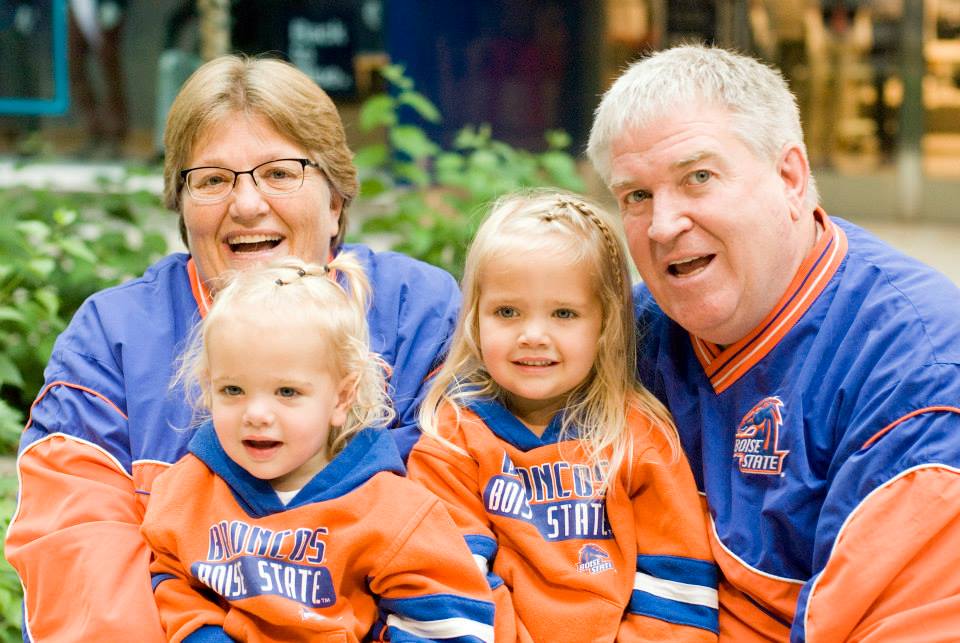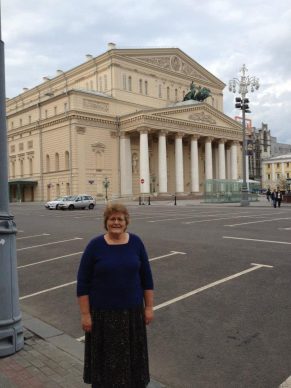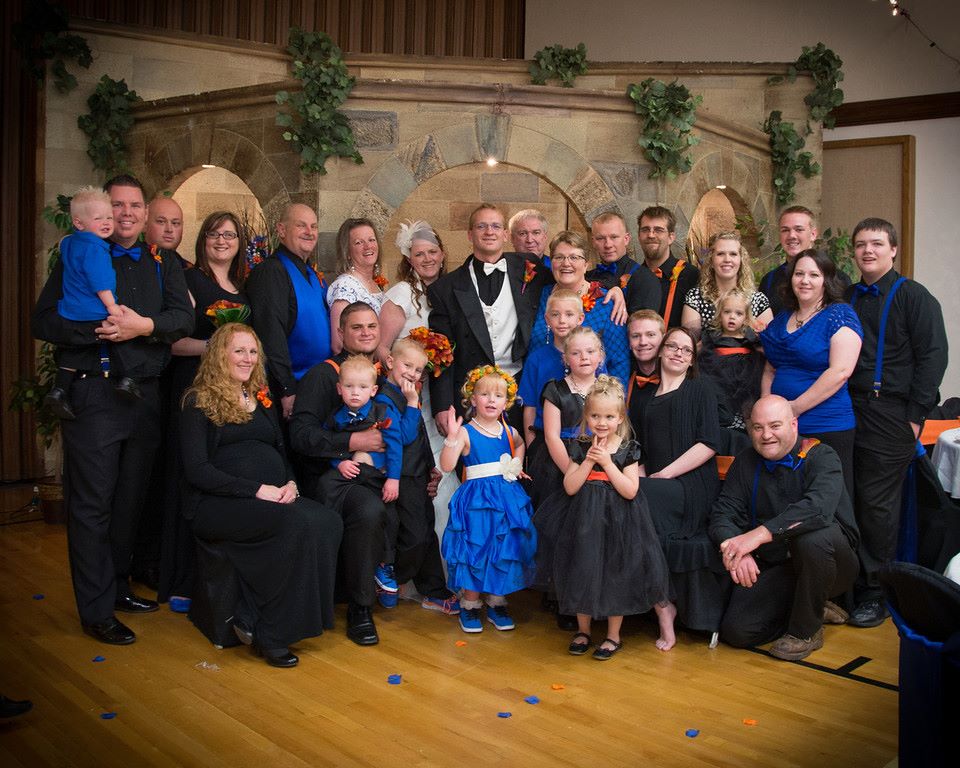At the age of 50, Sally Murray didn’t have a passport and never dreamed she’d find herself living across the world. But a prompting by the Spirit lead her and her family to Ghana, Africa where she involved herself in helping with schools and fundraising for supplies for the children. Sally learned valuable lessons in love, humility, and an increased capacity to feel the Spirit.
Tell me about your background.
I was born in Idaho Falls, ID. We moved around quite a bit when I was young, and eventually we ended up in Boise, Idaho, where I was raised. I attended Ricks College for two years and then studied at Boise State University for another year after that. I was married when I was a senior in college and began raising my family of six children. I worked as a stay-at-home mom. We have one daughter and five sons.
Later in your marriage, you moved to Ghana for your husband’s work. How did that happen?
We raised our family, for the most part, in the Boise area until 1997, when my husband was transferred to Salt Lake City for his job with the Church. Carey Woolsey, a man in our ward, was in charge of finding people to go on international assignments and we always teased him, saying, “When are you leaving for Africa?” One April, we were traveling to see our son, who was in prison (and that is another story), and on the way back, I felt Heavenly Father say to me, “You need to go to Africa.” We had our two youngest sons in the car and I argued silently with Heavenly Father for a while and said, “Excuse me, I have my first grandchild, we have a son in prison, and we have a few other issues.” He just gave me an answer for every one of those issues and I turned to my family and said, “We need to go to Africa.” My- 17-year old son, who was going to be a senior in high school, said, “I don’t have anything holding me back,” and my 14-year-old said, “That would be cool,” and my husband looked at me somewhat astounded and said, “Okay, I guess we’re going to Africa!”
How did it just come to you that you should move to Africa? Did you know there was an opening?
My husband contacted Carey Woolsey–the man in our ward–and told him we were interested in going to Africa. Steve and Carey had discussed the need for a Church finance person to be assigned to Ghana. The person in charge of temporal affairs in Africa, David Stapley, knew my husband and said he’d love to have him. You have to be approved by the Presiding Bishopric in order to take international assignments, and three weeks later they approved us, for some reason, and we went! That was in April of 2005, and we found ourselves in Ghana, Accra, Africa in the middle of August.
So you, your husband, and two kids just took off to Ghana?
Yes, and I didn’t even have a certified birth certificate, let alone a passport! But before we knew it, we were on a plane to Africa!
That must have been quite a shock for you. Tell me about your experience at first.
It was very interesting. They moved us into a beautiful guarded compound of twenty townhouses to a home with four bedrooms and a community swimming pool–the Church takes such good care of its international employees. When we went to church in Adenta, a town outside of Accra, for the first time, my husband, Steve, drove, and we didn’t really know where we were going. It took us about an hour to find it. (There are very few street signs in Ghana and so you use local landmarks such as the Shell Gas Station or the pink house on the corner for directions.) When we finally arrived, we realized that church was held in a rented building and no one was speaking English–they spoke Twi. Someone came and sat by us and translated. The next week I was called as an advisor to the Relief Society presidency. We met in my air-conditioned car for our presidency meetings because we had one little light in the building and the mosquitos were prevalent, which raised my concern about malaria.
I understand that you helped schools in Ghana. Can you tell me about that?
Our existing Relief Society President, Nancy Owusu, was released and Christina Awudi was sustained in her place—and we became dear friends. She had been going to college at the time and had a four-year degree, which is unusual; most teachers in Ghana have two-year degrees. Christina had just been assigned as the headmistress at a school–which is like a principal–and said, “You need to come to Akpormang and see the new school I’ve been assigned to!” I said, “You bet.” So I went to see her at her new school. After getting lost many times on the way there, I arrived. She had about 15-18 kids in a government-built school, which are made of cinderblock, with a tin roof. There were three rooms and a headmistress’s office. I walked inside, and here were these kids with broken pencils, and no books. The students had desks that were much too big for them, and Christina didn’t even have a teacher’s desk. She had a 12 x 12 cardboard box, where she put all her supplies, lying on the floor. During our time in Ghana, friends back home had sent us money and told me to do something with it. I looked at her and said, “I know what we can do with the money that people send.”
So I sent out emails to friends and family and told them that I wanted to help with supplies for Christina’s school. And for some reason, people sent us money. The money went straight to supplies. I would drive out once or twice a week and bring her school supplies. We started building round tables for the younger kids so they wouldn’t have to stand at their desks. We supplied a number of things for the school, like chairs, soccer balls, pencils, crayons, and books. Because of that, the parents of the children in the village and surrounding areas started coming around to check out the school’s progress, and Christina started getting more and more students who had been attending other schools that were further away. After that the parents began to show a greater interest and saw what we had done and decided they wanted to start a PTA. At their first PTA meeting, they raised $4 and we supplemented that with $6 more so they could open a bank account for their kids. The village supplied Christina with a desk because of all she had done for their school. This was a great sacrifice for the village, because the cost of the desk was around $75 and their average daily income was $1. When the district became aware of all Christiana was doing, they sent more things for her school. So it was just amazing what small baby steps did and the doors that were opened. It was just wonderful.
We worked for about a year with Christina, and I told her, “We’ve done a lot for your school. I wonder if there are any others that need help.” We drove to the district office and I asked them if there was another school we could help, and they told us we needed to go to Ayi Mensah. They gave us directions and we drove down a beautiful road that led to the base of the Aburi Hills to the small village of Ayi Mensa. We parked our little Honda Civic, got out, and asked for directions to the Ayi Mensa School. We were led down the path through the black poly bags (this is what they call black plastic bags that seem to litter most of Africa), through the chickens, and past the corrugated tin fences. There, under a huge tree, were four round tables with about 15-18 beautiful little children. There was one paid teacher and two village moms helping out. We told them we wanted to help and asked them to give us a list of things they needed. Thank heaven for Christina because they spoke very little English. After saying our good-byes, Christina and I drove to the side vendors, who sell their wares along the side of all the roads in Ghana, and bought things that could be used outside: big containers that they could put their supplies in and a bookshelf they could store in somebody’s house to hold the remainder. We worked with them for a year but by that time our international assignment had ended. A week before I left, David, who is the elder in charge of the schools, came to me and said, “The village will donate land for a school if you will build it.” I asked Diana Golden, who had been helping with the school project and was going to be in Ghana for another two years, if she would take over as a facilitator so that I could return to the States and raise money. When I got home, I enlisted the help of the Forever Young Foundation, through Sterling Tanner, their wonderful CEO, and asked if he would which receive the money I collected and then send it straight to Ghana. The school in Ayi Mensa just finished building their sixth room and I believe they are placing a roof over the headmistress’s office. I estimate that from 2006 until now we’ve probably raised–and this is just an estimate–between 40 to 50 thousand dollars and have had an impact on over 1000 students.
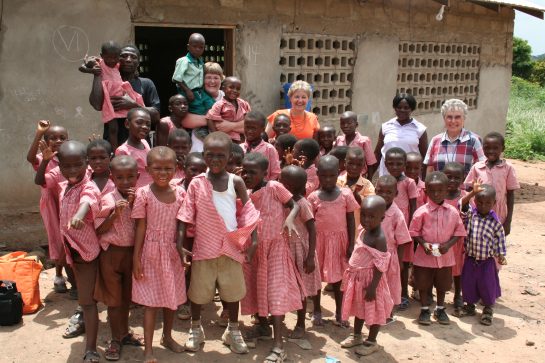
What changes did you see in the children and in the villages as a result of supplying these schools with the supplies that they needed?
First of all, these kids now have a chance at education. One of the first things the teachers try to do is teach the students English, because English is technically the language of Ghana, and English is also the language of opportunity. Second, the village communities now have a sense of pride and ownership because they have a school. You now see villages where the people come together to form a PTA. Now that these villages have schools, the kids won’t be bitten by the bugs in the sand anymore. And when it rains, they don’t have to send the kids home. It’s 20 degrees cooler inside those buildings, and during the dry season they have protection from the scorching sun. It’s just pretty amazing, isn’t it? Oh, you’re making me homesick talking about it!
What challenges did you experience during this journey?
It was hard to watch these teachers try so hard to help these kids but be unable to do as much as they wanted to because they’d had limited educational opportunities. Though they’re doing the best they can, teachers need more training. Challenges with the government were also discouraging. I remember reading an article in the newspaper that said there were no schools meeting under trees in Ghana. It was so interesting because as you went down this beautiful road to Aye Mensa that led up to the presidential palace, there were kids meeting under a tree. That was always discouraging. I watched David, the village elder, try to get the school built. With the first room, the villagers helped build it, but David has been pretty much building the rest. He gets help every once in a while. I watched the men in the villages sit around all day in the shade while the women did all the work, taking care of the children and selling their small goods on the side of the road. It was discouraging to see the villagers not helping David. It is very hard for the men to find work and I often think they need to follow David’s example and do all you can to help others. Africans have received so much humanitarian aid, especially those in Ghana, because it’s a safe place to be. You have to be really careful with how you help. That’s why we didn’t go in and build anything and why we had the villagers build it. That’s why we only offer supplies. We do it for the children, for an educational purpose. We’ve found that education is the best way to help. The gospel and education. The gospel changes lives and education makes it possible.
Tell me some of the small miracles and triumphs you saw along the way?
Well, who would have thought a girl from Idaho would be building a school in Ghana? Who would have thought a girl from Idaho would even go to Ghana? I have seen the tender mercies that come when you accept callings from Heavenly Father. These experiences change not just your life, but your family’s life. Our family has had some wild experiences, but our children have been blessed because of what we’ve been doing.
How did the Lord touch your life through your experiences in Ghana?
You know, we talked about that a lot with the other Church employees in Ghana. We all talked about what we love most about doing this, and of course we always say the people. But the second thing would be that you can feel the Spirit. When you live in the United States, you get so busy with things of the world that you don’t even feel the Spirit a lot of the time. When I left the United States and the rat race we live in, I felt the Spirit so much stronger. And when you’re working on a good cause, Heavenly Father blesses you with knowledge. And you’re working with these sweet, humble people who are just trying against all odds to do what they’re supposed to do and who know the Spirit. People in Ghana talk about their nighttime dreams a lot and I believe they talk about dreams because they can feel the Spirit. Talk about incredible people! I remember one of my American friends in Ghana saying, ““I’m going to go home and wash my ziplock bags and never buy new ones so I can keep the humility that I feel here.””I can’t explain it, but but it’s like being in the temple all the time. I see it in Russia,, too, where we now live while on another assignment. When you go to a country where there are such humble circumstances, you feel the Spirit because it can get through. It’s amazing.
You seem to have a positive outlook on life. How do you maintain this?
I guess you could say I have been blessed like Nephi: “I, Nephi, having been born of goodly parents.” I have a mother and father who are just amazing. My sweet mother is a saint; my father is a hoodlum, and I’m more like him. My mother has been a Relief Society president five times and I have never heard her say an unkind word. I remember one time asking my institute teacher, Don Castleton, who had been our bishop, “What can I do to make my life better?” He said, “The best thing you could ever do is look towards your mother. She’s the best example of love and kindness I have ever seen in my whole life. I’ve never met a woman who could love more than your mother.” It doesn’t matter who you talk to, they love my mother. My father, though he’s a hoodlum, is a good man and would do anything for her and anyone else. Their life has been a life of service. I think the way I keep a positive outlook is by trying never to look at myself. Service is my key to staying happy.
That’s inspiring. Thank you! Is there anything else you’d like to share?
Our kids have gone through some hard things in life. People come to us all the time when they start having trouble with their kids, which we all do, and ask how they can help their children. The only thing I can say is to tell your kids that you love them. Very few things have turned out the way I originally planned in my life, but I have found the most important thing you can do as a parent is to love your children and tell them that every day. There will be times you won’t want to say “I love you” and you’ll just think, “How can I love them?” But that is the answer: you have to tell your kids you love them. At some point in life they will come around. I still have some who are coming around.
At A Glance
Sally Miner Murray
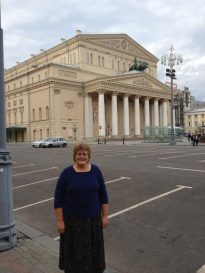 Location: Moscow, Russia
Location: Moscow, Russia
Age: 59
Marital status: Married for 37 years
Children: Six children: 1 daughter and 5 sons
Occupation: Homemaker
Schools Attended: Borah High School – Boise, ID; Ricks College – Rexburg, ID; Boise State University – Boise, ID
Languages Spoken at Home: English
Favorite Hymn: “I Stand All Amazed”
On The Web: http://www.foreveryoung.org/
Interview by Linda Yamamoto. Photos used with permission.
At A Glance

